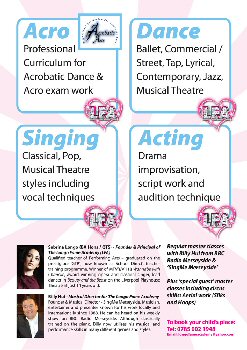|
Exciting new Fame Academy to
open in Liverpool!


THE new Longo Fame Academy, for
children and young adults, from 3 to 18, will be opening it's doors soon under the
leadership of local multi talented personality Sabrina Longo, award winner and
qualified teacher of Performing Arts. Sabrina will be joined by a team of
experts, notably BBC Radio Merseyside's Billy Hui, all offering tuition in
every aspect of the entertainment industry. Students taking part will have
classes each week.

Lessons in singing, dancing, acting, acro
dance, ballet, exam tuition, musical theatre and much more will be on offer at
this exciting, unique location with qualified staff to supervise your child's
development. Older students welcome too! This is a wonderful opportunity to
receive the very best coaching, training in such a wide variety of skills.

Students joining the academy will have a
fantastic opportunity to turn their potential talents into genuine paths to fame
and stardom. The classes will be held at the Childwall Sports and Science
Academy, Liverpool each Sunday.
|
 |
New therapy service for
young people
A new service which will provide
therapy to children and young people who have suffered trauma and neglect is set
to be commissioned in Liverpool.
At its meeting, on Friday, 20 January 2017, Liverpool City Council's Cabinet is being
asked to earmark £650,000 for the Therapeutic Service, over the next 3 years.
It will provide psychological therapy and counselling for those whose lives are
significantly affected by emotional and behavioural difficulties caused by
issues such as violence and abuse.
It is anticipated that the new early intervention service will help reduce the
number of young people coming into care, by providing the right help and support
to families to resolve mental health issues.
It is also hoped it will:-
► Reduce the number of children missing from School or at risk of exclusion.
► Improve School attendance and attainment.
► Increase identification of those at risk sexual or criminal exploitation.
► Cut cases of alcohol and drug abuse.
► Improved personal and social skills.
► Support young people and parents affected into education, employment and
training.
Councillor Barry Kushner, Cabinet member for Children's Services, said:-
"Improving the emotional wellbeing of children and young people is a massive
priority for the Council. This new service will give us the ability to be able
to intervene early, give families the support to help keep them together and
prevent young people ending up in care. Tackling the root cause of their
issues can transform the life of a young person and their family, giving them
the best possible chance of getting over the trauma that they have suffered."
The project will sit between the existing family support outreach team; set up
in 2015; which has worked with 150 children with emotional and behavioural
difficulties since last April, and the long established Children and Adolescent
Mental Health Service (CAMHS).
It will work closely with CAMHS and the community hubs run by the Young Peoples
Advisory Service (YPAS).
If the report is approved, a search will get underway for providers with the
service expected to be launched sometime in the summer.
Do emojis show true emotions
and reveal a person's personality and intentions?
THAT'S the question being asked by psychologists at Edge
Hill University in Lancashire.
In a journal article, that was published on 17 January 2017, Dr Linda Kaye and Dr Helen Wall ask
whether the use of emojis on social networking sites can help us understand
human personality and behaviour.
With 92% of the online population using them, they believe that by studying this
communication we can gather information to understand human emotions and our
perceptions of each other.
Linda Kaye said:- "Research into the use and interpretation of emojis is
in its infancy, but it has already been shown that they serve important nonverbal
functions in communication and can even provide an insight into the user's
personality.
Previous research has explored the neural processes in the brain and how this
differs for sentences with and without emojis. Interestingly, those with emojis
activated both the left and right sides of the brain.
The right side is typically an area associated with the control of emotions,
which suggests a different psychological response to emojis than in verbal tasks
when typically the left side of the brain is primarily dominant. There is
a need for us to study online behaviour to gain further insights into human
behaviour. If we can understand online behaviour, the way people think and
behave then we could also potentially predict behaviour in the 'real' world.
This is particularly important when considering deviance online and how we can
use online data as screening tools to help predict or tackle criminal
behaviour."
The full article is written with Stephanie Malone from Australian Catholic
University in Australia and is available to read in January 2017's edition of Trends
in Cognitive Science (Cell). It is also available in full,
online. |














